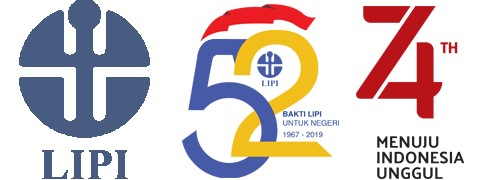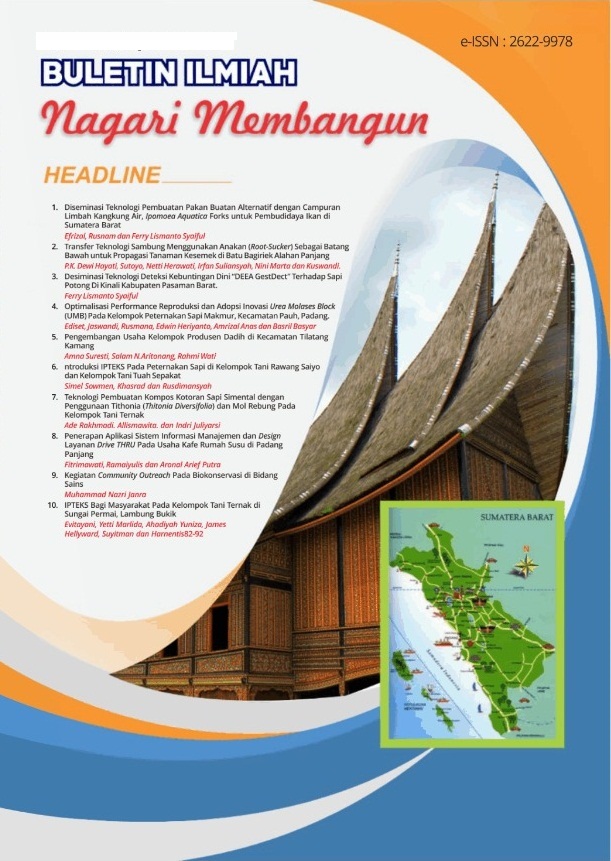UPAYA PENINGKATAN PENGETAHUAN ORANG TUA TERHADAP ZINC DAN PEMBERIAN ZINC KEPADA SISWA SD BUSTANUL ULUM PADANG
Abstract
Zinc is an essential micronutrient in the human body as a cofactor of about 300 enzymes. Zinc is very instrumental in the growth process, including maintaining the thymus so that atrophy is not fast. Zinc deficiency can affect the immune system. Zinc deficiency can be caused due to a lack of zinc intake. In theory, many factors affect zinc intake, among others, community knowledge, education, economy, diet, habits, and customs. Lambung Bukit Village is a fostered village of Andalas University. Most people in this village are classified as economically deficient because the community generally farms. The level of public knowledge about zinc is still lacking. This service aims to increase public knowledge of the importance of zinc on body health and the provision of zinc supplements to prevent zinc deficiency and is expected to reduce morbidity and mortality due to infection in children. This activity has been carried out at Bustanul Ulum Elementary School in Batu Busuk Village, Lambung Bukit Village, Pauh District, Padang City. Counseling conducted to 48 people (parents of students and teachers). Almost all parents' knowledge is lacking about zinc, the role, source of zinc, and its relation to several diseases. We hope this counseling can increase public knowledge about the importance of zinc on the body, mainly to prevent susceptibility to infections and any food sources that contain zinc. The results of a health examination by pediatricians found two students suffering from Congenital Heart Disease (CHD), poor oral hygiene, and many teeth carious students. Giving zinc syrup to children aged 7-10 years is expected to prevent zinc deficiency in children.
Downloads
References
Alioes, Y., Kadri, H. 2020. Upaya peningkatan pengetahuan tentang makanan jajanan dan pemeriksaan golongan darah pada murid SD Negeri 11 Lolong Belanti di Kecamatan Padang Utara. Buletin Ilmiah Nagari membangun: 3(1): 54-63
Franciotta, D., Verri, A., Zardini, E., Andreoni, L., De Amici, M., Moratti, R. 2006. Interferon-gamma and interleukin-4 proceding T cell in Down syndrome. Neurosci Lett, 395, page:67-70.
Heather, J., Blewett., Taylor, C.G. 2012. Dietary zinc deficiency in rodents: effects on T-cell development, maturation and phenotypes. Nutrients, 4 : 449-66.
Hidayat, A. 1999. Seng (zinc): Esensial bagi kesehatan. J Kedokteran Trisakti, 18(1):19-26.
Karammyar, M., Gheibi, S., Noroozi, M., Kord Valeshabad, A. 2013. Therapeutic effect of oral zinc supplementation on acute watery diarrhea with moderate dehydration: a double-blind randomized clinical trial. Iran J MedSci. 38: 93-9.
Megged, O. 2010. Down syndrome and streptococcuc group A disease in Hospitalized children. Acta Pedratr. 99: 796-8.
Nriagu, J. 2007. Zinc deficiency in Human Health. School of Public health. University of Michigan.
Prasad, A. S. 2012. Discoveryof human zincdeficiency; 50 yearlater. JTEMB, 26, page: 66-9.
Prasad, A. S. 2013. Discoveryof human zincdeficiency: itsimpacton human healthanddisease. Adv Nutr, 4:176-190.
Prasad, A. S. 2014. Zinc: An antioxidantand anti-inflammatory agent: roleofzinc in degenerative disorders of aging. JTEMB, 28: 364-7.
Ram, G & Chinen, J. 2011. Infection and immunodeficiency in Down syndrom. Clin Exp Immunol;164(1):9-16.
Rangan, A. M & Samman, S. 2012. Zinc intake and its dietary sources: results of the 2007 Australian nasional childrens nutrition and physical activity survey. Nutrient, 6:611-24.
Symond, D., Purnakarya, I., Rahmy, H.A., Firdaus, F., Erwinda, E. 2020. Peningkatan penerapan intervensi gizi terintegrasi untuk anak stunting di Kabupaten Pasaman Barat. Buletin Ilmiah Nagari membangun: 3(1): 1-9.





















